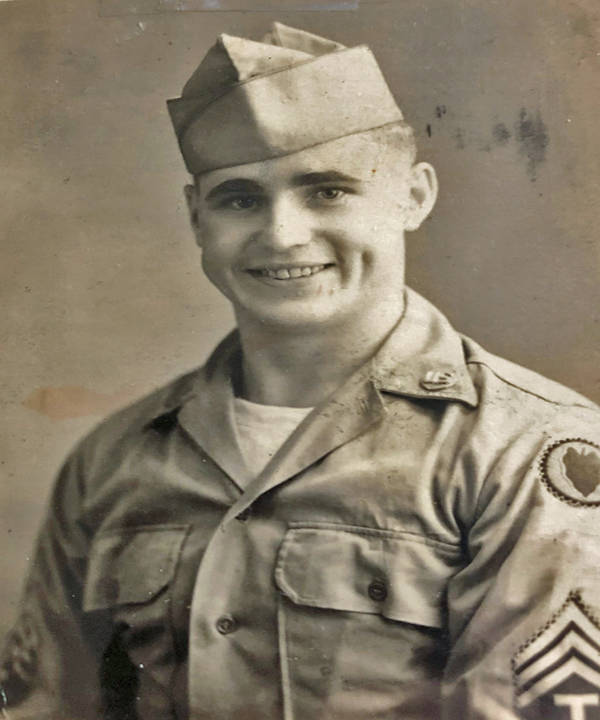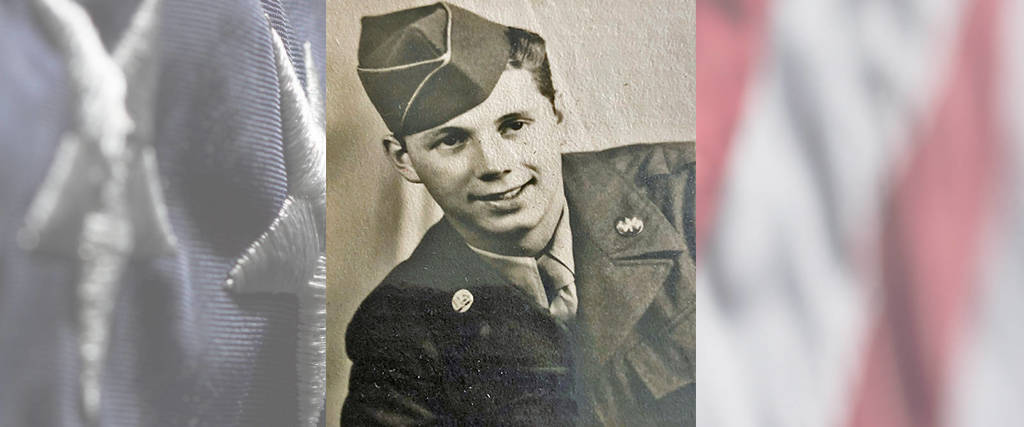U.S. Army World War II Crown Point, IN Flight date: October, 2019
By Al Konieczka, Honor Flight Chicago Veteran Interviews Volunteer
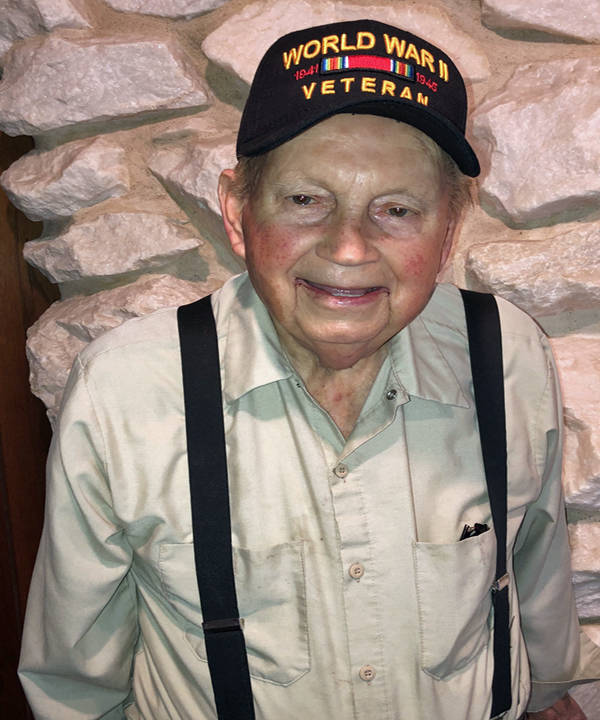
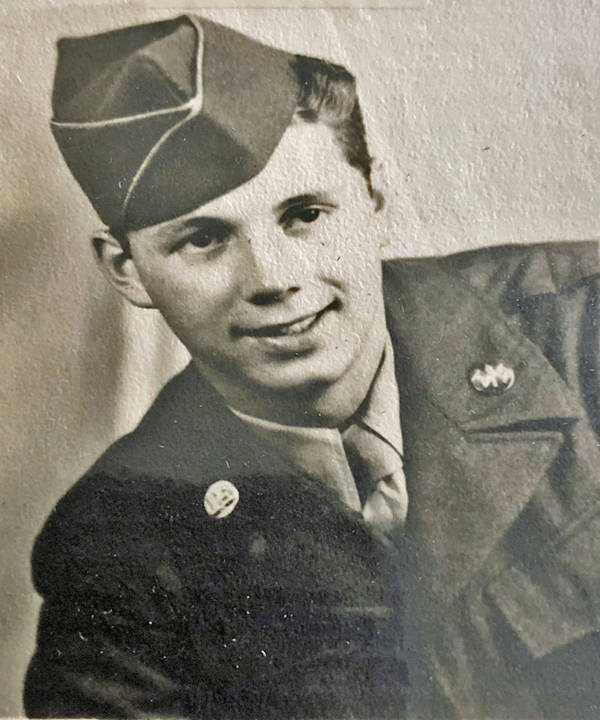
Growing up with his parents, older sister and baby brother in Northwest Indiana, William “Del” Cathey was eager to enlist. After graduating from Hammond Tech High School, he took a job working at a small local grocery store. One day he went to a Navy recruiting office in Chicago and brought paperwork home to his father, but his father wouldn’t sign it. “So I had to wait a few months, and the day I turned 18, on July 21, 1946, I enlisted in the Army,” recalls Del. “No one in my family had ever served before but I really wanted to. I had met many men coming back from the war, even some POWs and I felt it was my turn to serve my country.” Despite the fact that the war in Asia had officially ended on September 2, 1945, with the formal surrender of Japan, the United States was still in need of men and women to serve in the Armed Forces.
Del headed off for eight weeks of Basic Training at Fort Dix in New Jersey. After that, Del went home for a week before heading off to California by train. As Del remembers, “I never knew where they were sending me until I got to Camp Stoneman in California. At that point, I found out I was heading to Japan.” Camp Stoneman, located in Pittsburg, California, was the largest troop staging area on the West Coast of the United States for units deploying to the Pacific Theater of Operations.
Del had never been on a ship before in his life and the trip to Japan would not be a pleasant one for him. “I recall leaving California and heading out from the Golden Gate Bridge. The ride to Japan took 23 days. We experienced 2 typhoons during the trip; I was sea sick the entire time and lost 13 pounds. There were about 1,600 people on board and I met a guy named George who helped take care of me. George had a way of getting things for me, but I never asked how he got them. He could scrounge up anything and he would bring me some food and chocolates to help keep me sustained during the trip to Japan.”
When they finally landed at Camp Zama in Japan, they spent about 10 days there before being moved to Kokura, where they spent another 20 days until receiving word of their final destination. Kokura was the backup target for the “Little Boy” bomb on August 6, 1945. If Hiroshima had been clouded over, the first atomic bomb would have been dropped on Kokura. Kokura was the primary target for the “Fat Man” bomb on August 9, 1945, but on the morning of the raid, the city was obscured by clouds and smoke from the firebombing of the neighboring city of Yahata the day before. Since the mission commander had orders to drop the bomb visually and not by radar, he diverted to the secondary target, Nagasaki.
Del was ultimately assigned to the 24th Infantry Division and stationed at Camp Hakata near Fukuoka. Del would spend his entire time in country at that base. The Japanese base known as Hakata Annex was occupied and came under American control in October, 1945, following Japan’s defeat in WWII. In 1945, the 24th Infantry Division Artillery, as a component of the U.S. Eighth Army, was transferred from Osaka, Japan, to assume occupational control of the Fukuoka (Hakata) area. The unit remained in the area until 1950, when the Korean War began. The camp was located about 120 miles south of Hiroshima.
Del remembered, “The friendships I made were the best part of my service. You have to realize, our mindset was different going in. We weren’t there to fight anybody. We simply did what we were supposed to do. We were there to put a country back together and that was our job. And that’s what we did. Even though we were the 24th Infantry Division Artillery and we carried a gun, I never shot at anyone and I was never shot at.”
The town of Fukuoka had been destroyed from the war and while the camp was in good shape, the surrounding area was a mess. That southern area of Japan had a climate similar to Florida so the weather certainly helped in their rebuilding efforts. After about four months in Japan, Del was sent to Yokohama for six weeks of training in heavy duty construction with plans to become a lineman. The school offered all sorts of communication training, not just telephone or lineman training. Del recalls, “My good friend Ellis Jakes from Tennessee had gone for training before me and spent about two months there. When Ellis got back from communications school, he was put in charge of our wire group. Ellis was the guy who told us where to go and what work to do.”
Their wire unit was responsible for re-wiring the country with communication and telephone lines. The Army was also building a new housing project for the officers’ wives and for other service people coming to Japan that was part of the Army’s responsibility. His unit was also sent into many civilian areas to rebuild communication and telephone lines that had been destroyed during the war.
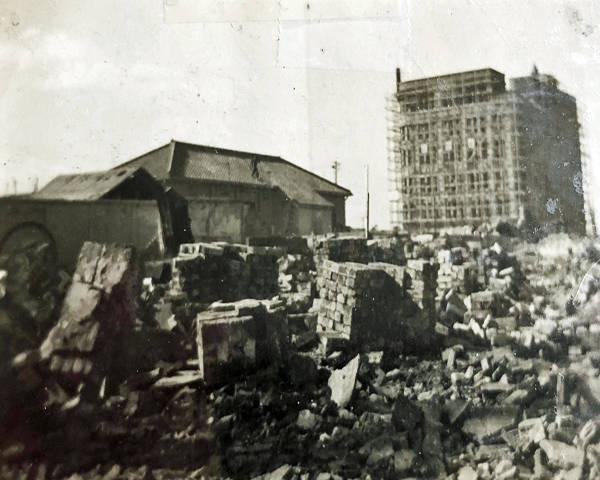
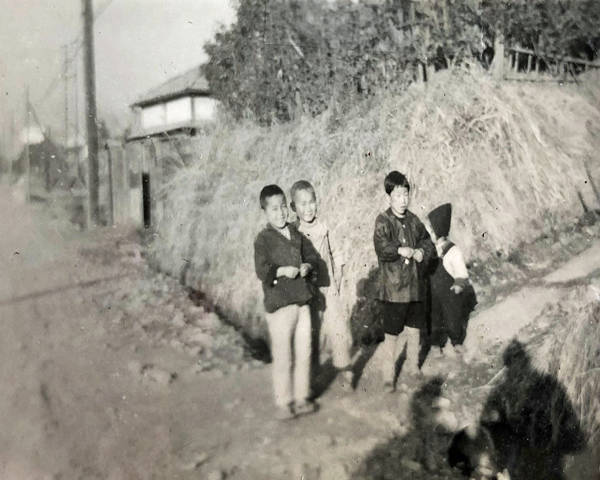
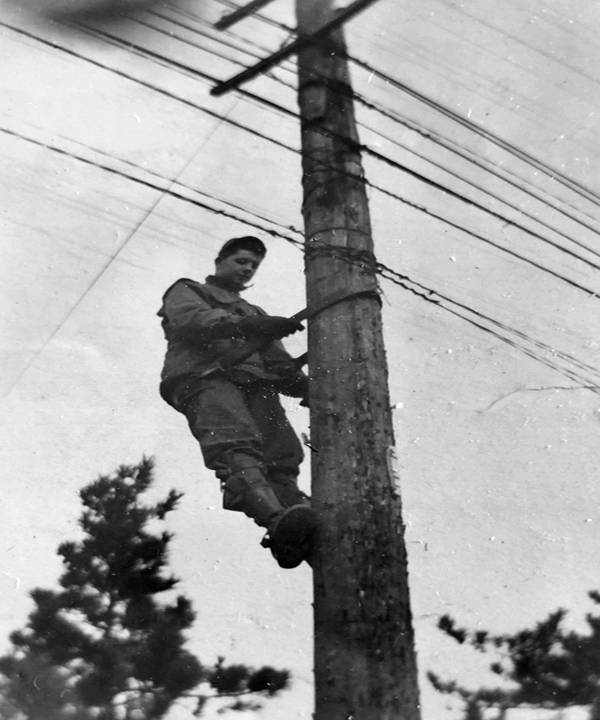
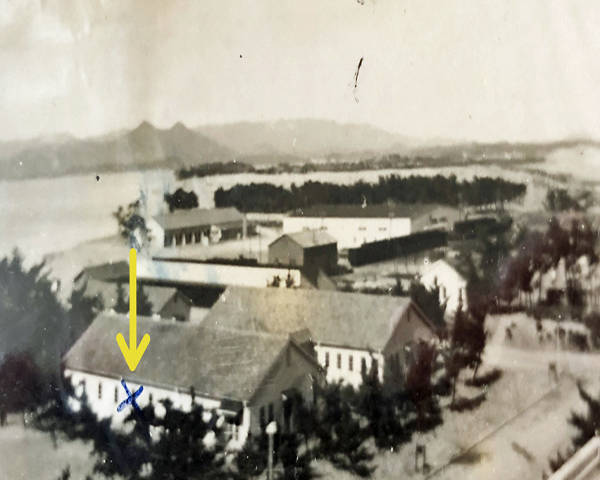
“Now why they thought I would be a good lineman is beyond me,” Del admitted. “For one thing, I’m afraid of heights. Climbing up those poles, you’re 35 feet in the air but from up there it seems like 70 feet. We had to carry 43 pounds of gear on our backs while we climbed up the pole. I can’t even lift 43 pounds now at my age.”
The camp had several buildings, the barracks, a mess hall, the headquarters building and several others. The camp was actually located on a peninsula. According to Del, “We stayed in very basic barracks and slept on cots. I was never very good at making my bed so I would look for a bed with broken springs; then, I didn’t have to do a very good job of making my bed because of the fact that the bed itself was defective. The back door of our barracks was just 50-60 feet from the bay and on the other side we were about 100 yards from the Sea of Japan.”
In December, 1946, Japan was hit with a huge earthquake measuring 8.4 near Osaka. Afterwards a tsunami washed away over 1,400 houses and caused 1,500 deaths. Del remembered the event. “I got woken up as my bed began jumping up and down. I had never been in an earthquake in my life. By the time I got a bit concerned, it stopped and so I fell back to sleep. We found out later from Armed Forces Radio what had happened. A close friend I had met at Basic Training was stationed in Osaka. He said the streets opened wide and there were fires; it was quite a horrible thing.”
The only communication with people back home was through letters. Del remembers writing letters each day back to his family and his girlfriend Ruth. Del and Ruth had met at a dance on the north side of Hammond, Indiana. At the time they met, Del was just 16 years old and Ruth was 15.
One of the best memories of his time in the Army was on the trip back to the United States. He was shipped back aboard the USS Republic, a decommissioned Navy vessel that was turned over to the Army on January 27, 1945. According to Del, “This time, we made it back home in just 13 days. Everyone with the rank of sergeant and under had to work KP, so I ended up working in the bakery. Now I don’t drink coffee, and I never have. We didn’t have milk over in Japan. I love milk, but I hadn’t had milk in over a year. In the bakery, they had frozen milk and these big vats of whipping cream they would make up so I was having a ball. I was eating cakes, pies and whipping cream. At the end of the day after they had fed all of the officers and USO troops on board, we were allowed to take some of the cakes and pies. I would take then down to my buddies so I was probably the best liked guy on the ship!”
When he arrived in California, Del was put on a train and headed back to Chicago. His girlfriend Ruth picked him up at the train station. Upon his return home, he tried to get a job with Standard Oil but they weren’t hiring and he was never interested in working at the steel mills, so he returned to the Kroger grocery store where he had worked prior to joining the Army. He was soon promoted to a store manager position in Gary, Indiana.
Del and Ruth were married on April 10, 1948, and started a family. Over the next 4-5 years, Del kept getting transferred and was managing bigger stores until he moved to a new expanding grocery store called Van Til’s. He was their first store manager and remained there for 18 years. While he moved around to many stores and even tried some sales positions and working at Dairy Queen, he always seemed to return to the grocery business. Del finally retired in 2017 at the age of 89, but he said with a smile, “I have an open invitation to go back at any time. I really enjoyed working, but I stepped back to be home and help take care of my wife Ruth.”
Del and Ruth have three daughters and four grandchildren who all live nearby. Del has never been back to visit Japan since his return from the service, but would have always liked to go visit. To this day Del still keeps in touch with and visits his close friend Ellis Jakes who lives in Tennessee and is a very prominent businessman. When I asked Del what his most memorable time in the Army was, he simply said, “Meeting people and learning their stories, both young and old. I met some really wonderful people during my time over there.”
